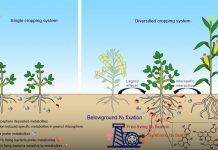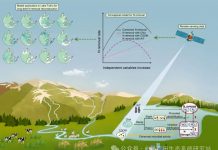Chen Lin Zhang Jiabao Zhao Bingzi Yan Pei Zhou Guixiang Xin Xiuli. Effects of straw amendment and moisture on microbial communities in Chinese fluvo-aquic soil. Journal of Soils and Sediments 2014 DOI: 10.1007-s11368-014-0924-2
Abstract
Purpose
Returning crop straw into fields is a typical agricultural practice to resolve an oversupply of straw and improve soil fertility. Soil microorganisms especially eukaryotic microorganisms play a critical role in straw decomposition. To date microbial communities in response to straw amendment at different moisture levels in Chinese fluvo-aquic soil are poorly understood. The aim of this study was to explore the effects of straw amendment and moisture on microbial communities in Chinese fluvo-aquic soil.
Materials and methods
Two soils (one was applied with organic manure and the other was not applied with any fertilizer) from a long-term field experiment in the North China Plain were collected. Soils with and without straw amendment at 25 and 55 % of the average water-holding capacities of the two soils were incubated at 25 °C for 80 days. All treatments were sampled 20 and 80 days after the start of incubation. Microbial biomass and community structure were analyzed by phospholipid fatty acids (PLFA) assay and the eukaryotic diversity and community composition were assessed via barcoded pyrosequencing of the 18S ribosomal RNA (rRNA) gene amplicons.
Results and discussion
PLFA analysis showed that straw amendment increased the biomass of Gram-positive bacteria Gram-negative bacteria actinobacteria and fungi and shifted microbial community structure. The varied straw availability resulted in a large variation in microbial community structure. In the presence of straw actinobacterial and fungal biomass both decreased under high moisture content. 18S rRNA gene pyrosequencing indicated that straw amendment decreased eukaryotic diversity and richness and probably restructured the eukaryotic community. Under identical moisture content long-term organic manure-fertilized soil had higher eukaryotic diversity and richness than the unfertilized soil. In the amended soils under high moisture content the relative abundance of dominant fungal taxa (Dikarya subkingdom Ascomycota phylum and Pezizomycotina subphylum) decreased.
Conclusions
Straw amendment increases microbial biomass shifts microbial community structure and decreases eukaryotic diversity and richness. High moisture content probably has a negative effect on fungal growth in the amended soils. In conclusion microbial communities in Chinese fluvo-aquic soil are significantly affected by straw amendment at different moisture levels.







